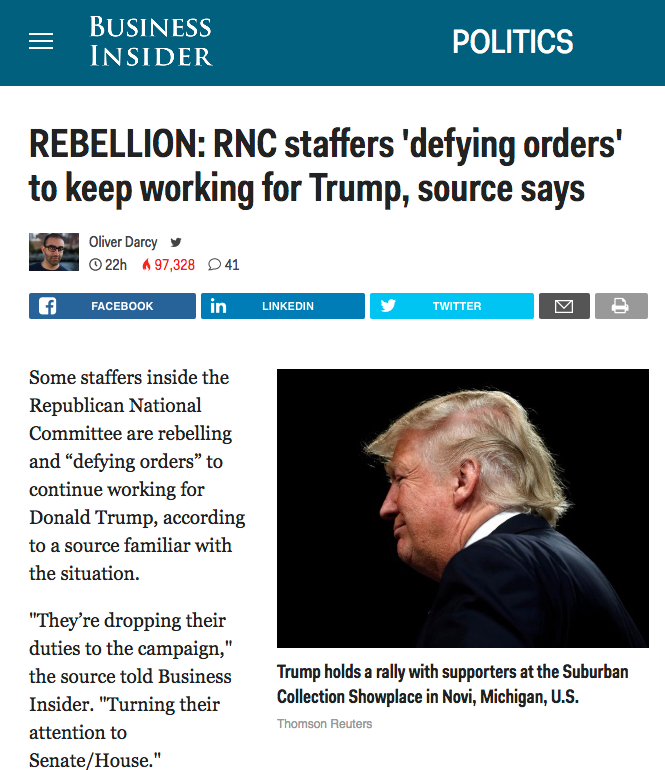Attachment ambiguity of the week
« previous post | next post »
Oliver Darcy, "REBELLION: RNC staffers 'defying orders' to keep working for Trump, source says", Business Insider 10/8/2016.
So how are those staffers defying orders? Are they ceasing to work for Trump despite orders to continue? In that case, it's "orders to keep working for Trump" that they're defying. Or are they defying instructions (to stop), (in order) to keep working for Trump?
Aaron Dinkin points out that the headline is perfectly ambiguous in this respect. And interestingly, both meanings are consistent with what we know about disagreement and confusion within the Republican party.
The article makes it clear that the intended meaning is the first one:
"They’re dropping their duties to the campaign," the source told Business Insider. "Turning their attention to Senate/House."
"Folks at the RNC are disgusted," the source said.
"Expect RNC [staffers] to start leaving if Reince doesn't act," the source added, referring to party chairman Reince Priebus.
The obligatory screenshot:

Theophylact said,
October 9, 2016 @ 1:12 pm
Here's a nice one from today's Slate: "Tina Fey and Jimmy Fallon Dropped By Saturday Night Live’s Weekend Update to Play Undecided Voters". (No, they've not been blackballed.)
Ellen K. said,
October 9, 2016 @ 1:20 pm
I really dislike the way it's punctuated, given the intended meaning, which we find out later, in the 2nd paragraph of the article. Makes me want to read it with the meaning they are continuing to work for the campaign despite orders not to. Seems to me it should be "defying orders [to continue working for Donald Trump]" in the article. In the headline, I would think just go for an inexact quote if it must be shown as a quote and do "defying orders to keep working for Trump".
Jamie said,
October 10, 2016 @ 2:51 am
I agree, Ellen. I was going to say, "surely the quotation marks remove any ambiguity". But in fact, they send you in completely the wrong direction.
B.Ma said,
October 10, 2016 @ 4:32 am
To me, it would still be ambiguous even when the whole phrase is placed in quotes.
I think there is no way around it except to explain in the first paragraph.
Ivan said,
October 10, 2016 @ 5:45 am
RNC staffers quit working for Trump despite orders, source says
Karen said,
October 10, 2016 @ 9:46 am
RNC staffers defy orders and [continue/quit] working for Trump
Terry Hunt said,
October 10, 2016 @ 9:53 am
It's always possible (though now seemingly not in this case) that the ambiguity in such an example is deliberate because the journalist (or sub-editor) is genuinely unsure of what's going on, but a deadline is looming. Whatever truth later emerges, the perpetrator can then claim to a critical superior or reader "But that's what I said!" I might possibly have been guilty of such subterfuge myself in times (though not Times) past.
Adrian said,
October 10, 2016 @ 10:29 am
I'm not sure that it's "perfectly ambiguous" since we bring our expectations to bear and they lead us – since being forced to work against one's will is a much more likely scenario than continuing to work for someone you're not supposed to – to a particular conclusion even if in this instance either alternative would make sense.
Timo said,
October 10, 2016 @ 3:49 pm
It seems to me that the journalist has no experience with indirect speech. Taking two words, putting them in quotation marks and constructing a sentence around them is at best misleading and at worst illegal. Most often it's misleading in an illegal way.
I have to assume that none of the words in the sentence other than "defying orders" were actually part of what the source said. Because if they were, then why would the journalist have put just these two words in quotation marks? So it's a misquotation by default, and we can't even be sure if any of the other quotations in the article are the least bit faithful.
Santa Claus's secret evil twin could be defying orders to finish his vegetables, for all I know.
Rodger C said,
October 11, 2016 @ 7:02 am
Timo, "'defying orders'" in quotes is journalese for "said to be defying orders." If it's illegal, American journalists break the law a lot. This blog has probably discussed cases where this use of quotes leads to amusing ambiguities.